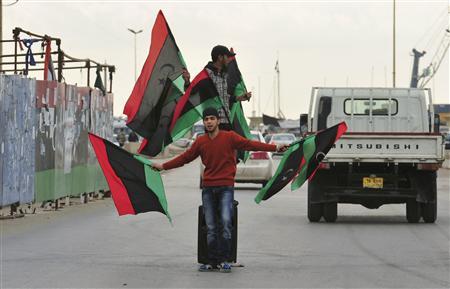The capture of Muammar Gaddafi’s son Saif al-Islam ties up an awkward loose end for Libya’s new rulers, but disputes over what to do with him could severely strain the country’s fledgling systems and structures.

Saif al-Islam, once held up as a potentially progressive future leader of Libya and face of its rapprochement with the West, was seized in the desert and flown to the western mountain town of Zintan.
In the short term, his capture is seen perhaps offering a useful distraction from the growing problems faced by post-war Libya. But some fear it may simply end up fuelling further division or damage to the reputation of those now in charge.
While Saif al-Islam looked for now to have avoided the brutal fate of his father – killed shortly after his capture – it is far from clear what will happen next.
Western states in particular are keen that he be handed over to the International Criminal Court, which indicted him earlier this year for crimes against humanity during the crackdown on protesters.
“This may temporarily bring the feelgood factor back to the streets, with most of the recent attention being focused on clashes and divisions between different rebel militias, and protests over pay and the perceived mistakes of the NTC,” said Alan Fraser, Middle East analyst for London-based risk consultancy AKE, referring to post-Gaddafi transitional authorities.
“(But) what’s for certain is that it will ignite passions that could have the potential to destabilise the reconstruction process. There will be a lot of media attention on this issue and that will likely prevent it from going away.”
Senior members of Libya’s NTC have said they would rather he was tried in the country, but for now lack any coherent legal system with which to do so. As things stand, it is far from clear whether those in charge in Tripoli have the clout to take control of the prisoner.
Zintan was one of the western towns that bore the brunt of Gaddafi’s military wrath during the early days of the conflict. Like many other regions, it now has its own largely autonomous forces that have yet to be brought under the direct control of the NTC.
“ACID TEST”
“This is an acid test of the NTC’s authority,” said Henry Smith, Libya analyst for London-based consultancy Control Risks. “The capture presents a challenge … if they want to try Saif then what can they do to make Zintan hand him over.
“They do not have the capacity to use coercive means so do they offer the town the coveted security portfolios in the forthcoming cabinet? If so, then to which of the Zintan militias? They may leave his fate to the Zintanis, but then where does that leave Libya’s embryonic justice system?”
Western human rights groups were critical of the mob justice handed out to Gaddafi senior and to at least one of his sons, and, along with many foreign governments, are demanding Saif al-Islam be better treated.
“The authorities will send an important message that there’s a new era in Libya, marked by the rule of law, by treating Saif al-Islam humanely and surrendering him to the ICC,” said Richard Dicker, international justice director at Human Rights Watch.
“His fair prosecution at the ICC will afford Libyans a chance to see justice served in a trial that the international community stands behind.”
Human Rights Watch said there was far too much evidence of extrajudicial killings of former Gaddafi loyalists by opposition fighters as well as mistreatment in custody.
Rights group Amnesty International said an immediate transfer to the ICC was the best option for Saif al-Islam.
KNOWS TOO MANY SECRETS?
“He must be handed over to the ICC, and his safety and rights must be guaranteed,” said Hassiba Hadj Sahraoui, Amnesty International’s Middle East and North Africa Deputy Director.
“After what happened after the capture of Muammar and Mutassim Gaddafi, we hold the NTC responsible for preventing similar harm coming to Saif al-Islam al-Gaddafi, so that he can face justice for his alleged crimes in a fair trial with no death penalty.”
But other analysts are unconvinced that handing the most prominent surviving member of the Gaddafi clan over to perceived foreign justice is a viable option for the NTC, keen to avoid any perceptions it might become a Western stooge.
A well conducted trial, they say, could actually serve to burnish the NTC’s reputation. But some worry that a chaotic trial — particularly if followed by an execution — could simply reinforce the image of a country largely out of control. Others ponder just how much political damage the well-connected Saif al-Islam might do in the witness box.
“A prolonged trial may also bring divisions to the surface, and Saif may know a lot of secrets that could damage the reputations of some in the NTC and the West,” said Fraser.
“He could potentially throw the cat among the pigeons and divert attention from the task of restoring security and political stability.”
Source: Reuters






















